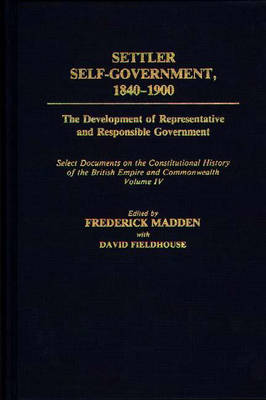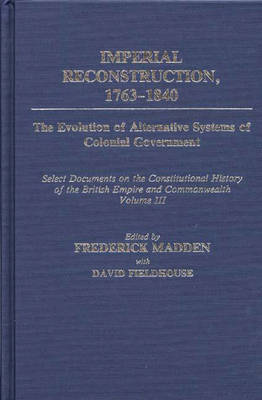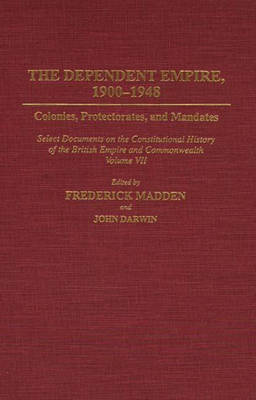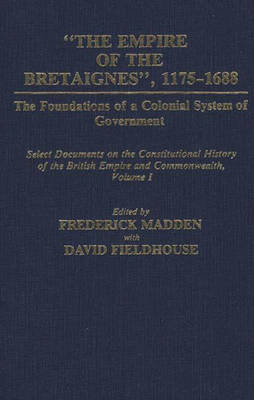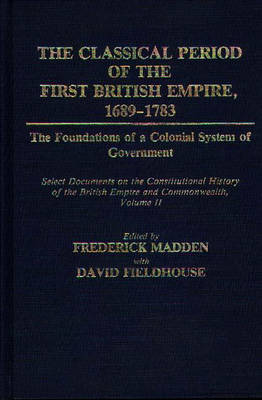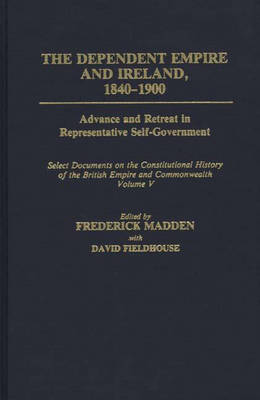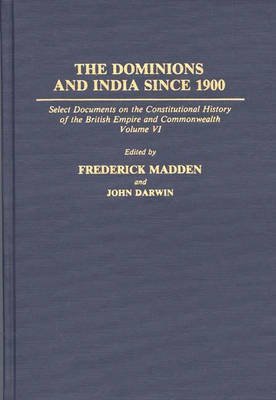Documents in Imperial History
8 total works
As the previous volumes in this series have shown, Britain's system of unfederal government had, by 1840, passed a cultural crossroads. There had been a parting of the ways in which the old representative system that had provided rule for colonies (including those in America and the Caribbean) in earlier centuries was being superseded. In this fourth volume Madden and Fieldhouse focus on those colonies in North America, Australasia, and South Africa where British subjects had settled in considerable numbers, and where the restrictions of the old system had been outgrown and representative and responsible government was developing toward full self-government. This fourth volume illustrates the larger themes in the evolution of self-government in these colonies.
The book examines the theme of self-government through four separate sections. Section I approaches the issue from the British viewpoint, surveying diverse concepts of the empire, the changes in imperial institutions, and attitudes toward trade, defense, and legal uniformity. Section II examines the evolution of, and later developments in, responsible government in these settled colonies, and Section III looks at the extension of self-government beyond the confines of internal domestic affairs. Finally, Section IV concentrates on the experiments in federal government among the contiguous groupings of colonies in North America, Australasia, and South Africa. The book also includes a preface with background and historical data, a note on primary and secondary sources, a listing of Secretaries of State from 1839 to 1903, and a comprehensive index. As with all the books in this series, this volume will be an important reference source for courses in British history as well as in the history of colonization. It will also be a valuable addition to university, research, and public libraries.
This collection of documents presents an enlightening picture of the colonial government of the British Commonwealth during the Second British Empire. Using numerous original documents, with preference given to those not previously published or readily available, the editors have delineated the major themes of the period from 1763 to 1840.
The Dependent Empire, 1900-1948
by John Darwin, Gowher Rizvi, and Frederick Madden
The penultimate volume in this documentary series covers the first part of the 20th century processes of decolonization within the British Empire, concluding with the independence of Ceylon, the first of the non-European-settled colonies. It also illustrates constitutional developments in the West Indies (particularly Jamaica, Trinidad, and British Guiana), Mauritius and Seychelles, Hong Kong, Fiji, the Western Pacific, Gibraltar, the Falklands, and West, East, and Central-Southern Africa, as well as advance and retreat in Malta and Cyprus. There is a section on Egypt and on the mandates of Palestine, Transjordania, and Mesopotamia.
An introductory section demonstrates the changes both in attitudes to and the dimensions of colonial rule during the period from the deep freeze of trusteeship to partnership. The concluding date saw, in addition to Ceylon's full membership in the Commonwealth, the speedy replacement of an abortive union of Malaya by a federation, a failed initiative in Cyprus, and what proved to be abortive reform in Hong Kong and Fiji, treaty revision in Egypt, a policy change in the Sudan, the surrender of the Palestine mandate, and the establishment of Israel. By 1948, though doubts remained about a closer association of the colonies, protectorates, and mandates in West, East, and Central Africa, there was optimism about a possible federation of the Caribbean.
The Empire of the Bretaignes, 1175-1688: The Foundations of a Colonial System of Government
by David Fieldhouse and Frederick Madden
This first volume of a projected four-volume set details the impressive record of eight hundred years of English (later British) imperial rule. The editors have assembled the earliest documentary evidence necessary for a fundamental understanding of the priorities, devices, and frustrations in the British imperial experience. The documents balance the ideas, policies, and actions emanating from England with those evolving in the various colonies. This juxtaposition emphasizes the similarity of the problems experienced by the individual colonies. The documents also illustrate the relationship between constitutional developments and ideas in Britain, in individual colonies, and in the empire as a whole.
The Classical Period of the First British Empire, 1689-1783: The Foundations of a Colonial System of Government
by Frederick Madden and David Fieldhouse
Beginning with the consolidation of British colonial rule and ending with the signing of the Treaty of Versailles, the years 1689-1783 marked a new era for the British imperial system, both in the economic relations of Britain and her colonies and in the growth of the political, constitutional, and legal status of the colonies and the institutions for their government. The documents trace the attack on, and defense of charters; attempts at consolidation and union; the application and evolution of colonial law; and the workings of the machinery of government (government, counsels, assemblies, judiciary, etc.) with emphasis on the central problem of revenue: leading to the crisis in, and loss of, the American empire. An extensive introduction places the developments of this century in historical perspective and suggests their importance for a complete understanding of British imperial history.
The Dependent Empire and Ireland, 1840-1900
by David Fieldhouse and Frederick Madden
This volume--the fifth in a series providing key documents for the constitutional history of the British Empire and Commonwealth from the twelfth century to the twentieth--deals with those dependencies of the Crown where for various reasons it was considered premature to concede fully representative, let alone responsible, government, and also with Ireland where the union with Britain made in 1800 was coming under increasing strain. It covers the years from 1840 to 1900, in parallel with the companion volume IV which dealt with the four main settler colonies. The documents in this volume illustrate the ways in which Britain attempted to devise forms of government it was thought would be, at least in the short term, more suitable for dependencies which had few British settlers who might successfully operate a representative system--and where the majority of indigenous peoples needed protection against such a minority. There was, however, a desire that such colonies should be as self-governing and self-sufficient as possible, but a commitment to trusteeship operated against any rule-of-thumb concession of the sort of constitutions granted contemporaneously to settler colonies.
The first section of this volume focuses on British imperial authority and the means whereby it attempted to exercise supervision over the scattered parts of the dependent empire (the so-called British settlements; protectorates under extra-territorial jurisdiction; the use of chartered companies). India is the subject of the second section: documents are here included illustrating the transfer of power from a chartered company back to the Crown and the hesitant moves toward quasi-representation on the Indian councils. A third section is concerned with the collapse of the old representative system in the West Indian colonies and the experiment with a responsive government in Jamaica. The fourth section shows what happened to the original Crown colonies and to new ones acquired in this period, together with adjacent spheres of influence and protectorates. There is then a section dealing with a group of special cases--the Ionian Islands, Cyprus, and Egypt, while the final section deals with the unique problems of Ireland and the attempts made to devolve a measure of internal self-government on John Bull's other Island to appease growing nationalist and inter-sectarian tensions.
The sixth volume in Greenwood's ongoing series, this book is the first of three fine volumes to cover the twentieth century and the last stages in decolonization of the British Empire. It is concerned with the original five Dominions, the apparently inappropriate association of the Irish Free State with those Dominions, and the similarly anomalous status of India, the first non-European dependency and the first republic to secure full membership in the Commonwealth and to make it a multiracial association. The book documents the evolution of, changes in, and rise and fall of that Commonwealth association; the shifts in the balance of powers within the Canadian and Australian federations; the fulfillment of union in South Africa and Ireland; the coherence emerging in New Zealand; the bankruptcy in Newfoundland; and the separation of India and Pakistan. Two forthcoming volumes will deal with the colonies, protectorates, and mandates in the twentieth century.
